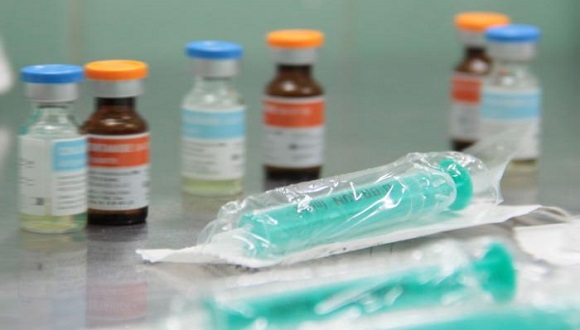It will be the only producer of this type of antibiotic in the country.
Photo: Yaimi Ravelo/ Granma
An injectable cephalosporin plant, whose completion is expected by the end of this year, will allow the production in Cuba of a group of injectable beta-lactam antibiotics, widely used in intensive care, and which are currently imported at high costs.
These are the cases of the antimicrobials Meropenem 500 mg and 1 mg, Ceftriaxone (Rocephin) 1 g, Cefotaxime 1 g, Cefazolin 500 mg and 1 g, Cefuroxime 750 mg, Ceftazidime 1 g, and Cefepime 1 g.
In a press tour of the investment, in the construction process at the Empresa Farmacéutica 8 de Marzo, the general director of the entity, Xenia Madrazo Sagre, specified that, before the end of 2022, the plant must be producing.
It will be the only producer of this type of antibiotic in the country, and 90% of the equipment to be used is already in Cuba, he added.
Dr. Eduardo Martínez Díaz, president of BioCubaFarma, pointed out that importing these antibiotics costs the country between seven and eight million dollars a year, so producing them in the national territory will reduce expenses.
Injectables such as Meropenem, Rocephin and Cefotaxime are essential antibiotics for hospital use in intensive care, with a wide spectrum of treatment of bacterial infections, pneumonia and meningitis, among other diseases.
This new plant will be the third to operate at the Empresa Farmacéutica 8 de Marzo, which already has two others: one for oral cephalosporins and another for penicillanics.
This was reported in a report by the Granma newspaper, specifying that these drugs are Meropenem 500 mg and 1 mg, Ceftriaxone (Rocephin) 1 g, Cefotaxime 1 g, Cefazolin 500 mg and 1 g, Cefuroxime 750 mg, Ceftazidime 1 g, and Cefepime 1 g.
The plant, which will work in the Pharmaceutical Company March 8, will be the only producer of this type of antibiotic in the country, and 90 percent of the equipment that will be used is already in Cuba, stressed the general director of the entity, Xenia Madrazo Sagre.
Dr. Eduardo Martínez Díaz, president of BioCubaFarma, pointed out that importing these antibiotics costs the country between seven and eight million dollars a year, so producing them in the national territory will reduce expenses.
Injectables such as Meropenem, Rocephin and Cefotaxime are essential antibiotics for hospital use in intensive care, with a wide spectrum of treatment of bacterial infections, pneumonia and meningitis, among other diseases.
The new plant will be the third to operate at Empresa Farmacéutica 8 de Marzo, which already has one for oral cephalosporins and another for penicillanics.
(Taken from Granma and ACN)
